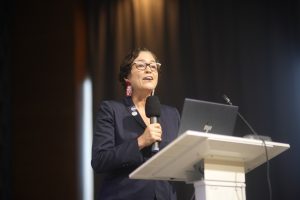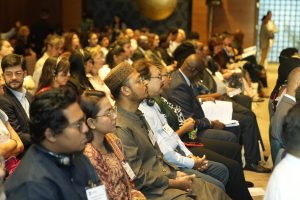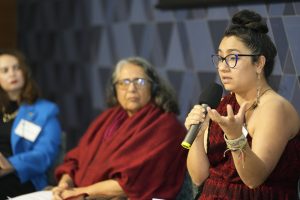More than 200 International Lawyers Assisting Workers Network (ILAW) members gathered in Casablanca, Morocco, October 9 to 11 at their 2024 Global Conference to share ideas and to collaborate on legal strategies to promote and defend worker rights.
The Solidarity Center established the ILAW Network in 2018 as a way for pro-labor lawyers worldwide to bring together legal practitioners and scholars in an exchange of ideas and information in order to best represent the rights and interests of workers and their organizations wherever they may be.
ILAW lawyers working together have taken legal strategies that are successful in one country and deploy them elsewhere. In doing so, they have set new legal precedents that build a stronger foundation for the expansion of worker rights around the globe.

Credit: Mosa’ab Elshamy
Solidarity Center Executive Director Shawna Bader-Blau welcomed attendees, describing the network of over 1,300 members in more than 90 countries as “uniquely situated to take on global corporations suppressing worker rights.”
She cited the successful advocacy of women labor lawyers for new International Labor Organization (ILO) treaties, like Convention 189 on domestic workers and Convention 190 on violence and harassment.
Solidarity Center Rule of Law Director and ILAW Network Chair Jeffrey Vogt laid out the conference’s purpose. “Around the world, the rights of workers and unions are under attack. Employers are well-resourced and coordinated in their efforts to shape law and policy. It is essential that workers and unions do the same. Through ILAW, we can learn from each other, build from successes and failures, and strengthen our impact through legal solidarity.”

Credit: Mosa’ab Elshamy
The importance of interconnectedness was woven throughout many plenary sessions and discussions. Networking, learning from and collaborating across countries and regions was a key part of the conference, as attendees talked about the commonalities of their work.
The opening plenary, moderated by Solidarity Center’s Rule of Law Deputy Director Monika Mehta, focused on the impact of technology in the world of work, including but not only digital platform workers, from Amazon warehouses workers to content moderators for major social media firms.
Panelist Liz Lenjo described the content moderators in Kenya who filed a lawsuit against Meta (the parent company of Facebook, Instagram and Threads) and Sama, the local contractor, citing poor working conditions, union busting and inadequate mental health support.
These workers were hired to screen posts, videos and messages for Facebook and remove harmful or offensive content. Workers spent hours viewing violent and disturbing images and videos. They were left on their own to deal with the psychological trauma. In a landmark ruling, the Kenyan court determined it had jurisdiction over Meta.

Credit: Mosa’ab Elshamy
Sandra Muñoz discussed how women in Colombia’s parliament recently passed legislation to harassment in the workplace and linked the fight for equality to equality for all. “Unless we can overcome inequality,” Muñoz said, “we can’t overcome inequality as a whole.”
Kayan Leung also described successful litigation she undertook in South Africa to establish parity in paid parental leave in order that the responsibility of care does not default to women. The ILAW Network filed an amicus brief in that case.
During the panel on Just Transition, Angelica Maria Palacios Martinez spoke about the efforts to get Colombia’s government to recognize trade unions’ essential role in Just Transition and protecting the whole population. “From the trade union world, we have called out the government to recognize us as a key player, she said, “so that these public policies are focused on protecting the entire population, and in particular, protecting the workers.”
Abdullah Nahid of the Maldives, one of the countries most affected by climate change, described union efforts to support workers in the tourism and fisheries sector.
On the panel on the informal economy, Madhulika Tatigotla discussed the growth of the informal economy in India. India’s informal economy continues to grow, as the formal sector continues to informalize as, for example, 40 percent of factory workers are now on temporary contracts. Recently, workers and their legal advocates developed a comprehensive draft law for workers in the informal economy to extend labor rights and benefits.
In the final right to strike plenary, Paapa Danquah noted the increasing international threats to the right to strike, linking it to civil liberties. “The attack on the right to strike on the international level is the first step to taking away the right to strike everywhere,” Danquah said. “Whenever you see attacks on the right to strike, there are also attacks on collective bargaining and civil liberty.” He described how the ITUC was involved in litigation before the International Court of Justice to protect the right to strike as a principle of international law.
As the conference ended, attendees discussed priorities for the coming year, from more collaboration between all members to deepening national and regional labor law networks, cross-pollination between ILAW regions, increasing engagement with social movements and Indigenous communities in order to support union growth. Attendees left the conference energized and committed to forging a robust labor law network for a stronger global labor movement.

